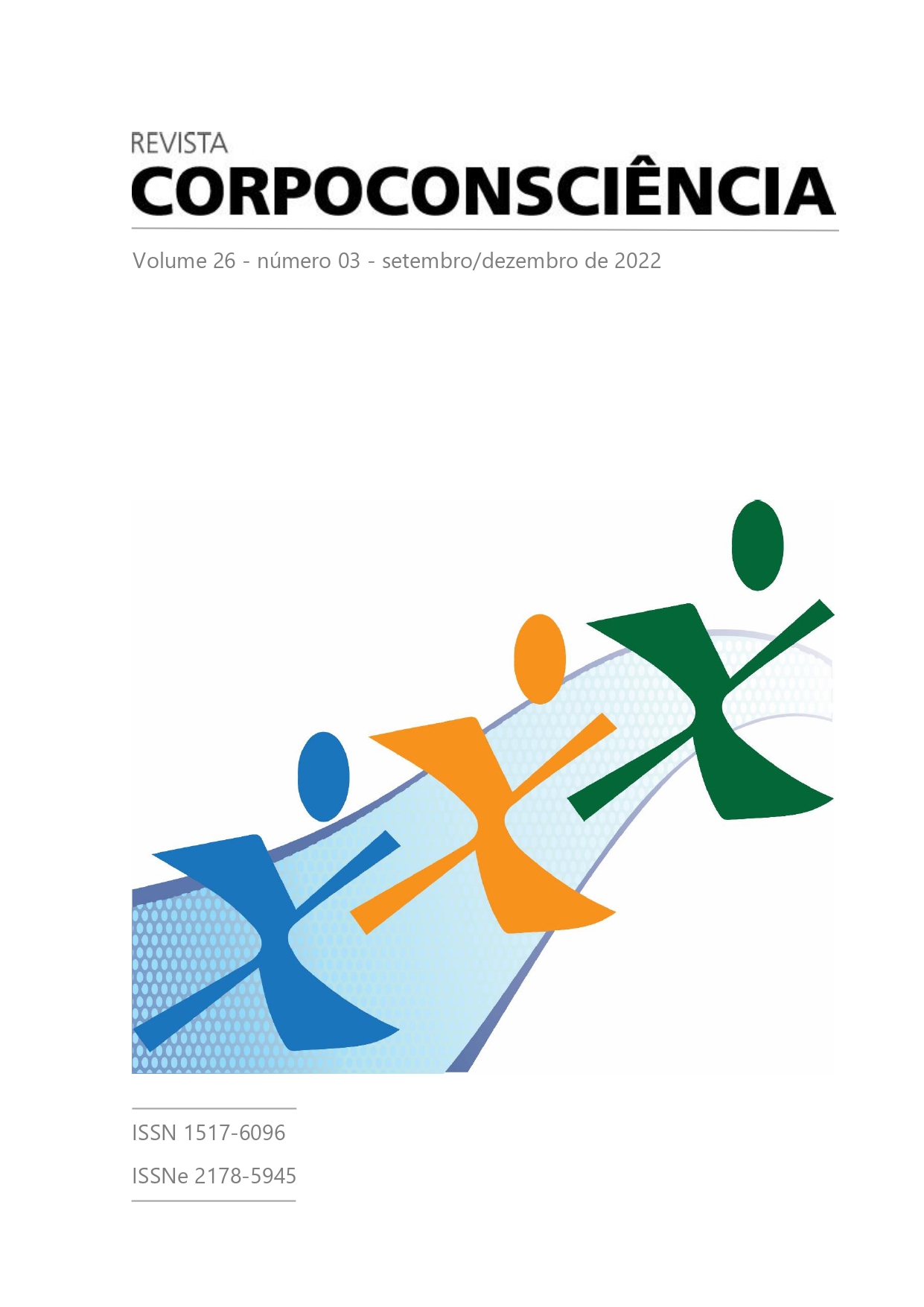EFECTOS DEL ENTRENAMIENTO COMBINADO SOBRE LOS SÍNTOMAS DEPRESIVOS Y LA CONDICIÓN FÍSICA EN RECLUSOS QUÍMICAMENTE DEPENDIENTES
UN ENSAYO CLÍNICO CONTROLADO ALEATORIO
DOI:
https://doi.org/10.51283/rc.v26i3.14472Palabras clave:
Dependncia Química, Actividad Física, Depresión, ReclusosResumen
El objetivo fue analizar el efecto del entrenamiento combinado sobre los síntomas depresivos y la condición física de los drogodependientes. Veintinueve drogadictos masculinos (34,24 ± 7,76 años) fueron asignados aleatoriamente al grupo de entrenamiento combinado (GTC) y al grupo de control (GC). Ambos grupos realizaron pruebas de aptitud física antes y después de 12 semanas de intervención. El GTC realizó entrenamiento combinado (fuerza y aeróbico) en tres sesiones semanales, con duración progresiva de 30 a 48 minutos y el GC mantuvo las actividades habituales. El GTC mostró un aumento en el número de repeticiones en las pruebas de resistencia abdominal (p<0,001), flexión de codo (p<0,001), sentado y de pie (0,014) y mejora de la capacidad aeróbica (p=0,015) después de la intervención. En cuanto a los síntomas depresivos, el GTC mostró valores más bajos que el GC (p=0,015) en el período posterior a la intervención. Se concluye que el entrenamiento combinado mejora la condición física y puede ayudar a reducir los síntomas depresivos en drogodependientes privados de libertad.
Referencias
BATTAGLIA, Claudia e colaboradores. Benefits of selected physical exercise programs in detention: a randomized controlled study. International journal of environmental research public health, v. 10, n. 11, p. 14, p. 5683-5696, 2013.
CONSTANTINO, Patricia; ASSIS, Simone Gonçalves de; PINTO, Liana Wernersbach. O impacto da prisão na saúde mental dos presos do estado do Rio de Janeiro, Brasil. Ciência & saúde coletiva, v. 21, n. 7, p. 2089–2100, 2016.
FONTOURA, Andréa Silveira da; FORMENTIN, Charles Marques; ABECH, Everson Alves. Guia prático de avaliação física: uma abordagem didática, abrangente e atualizada. São Paulo: Phorte, 2011.
DIEHL, Alessandra; CORDEIRO, Daniel Cruz; LARANJEIRA, Ronaldo. Dependência química: prevenção, tratamento e políticas públicas. Porto Alegre, RS: Artmed, 2018.
DOLEZAL, Brett A. e colaboradores. Eight weeks of exercise training improves fitness measures in methamphetamine-dependent individuals in residential treatment. Journal of addiction medicine, v. 7, n. 2, p.122-128, 2013.
ELLINGSEN, Maren Mikkelsen e colaboradores. Effects of acute exercise on drug craving, self-esteem, mood and affect in adults with poly-substance dependence: feasibility and preliminary findings. Drug and alcohol review, v. 37, n. 6, p. 789-793, 2018.
FISCHER, Jan. e colaboradores. Fitness levels and physical activity among class A drug users entering prison. British journal of sports medicine, v. 46, n. 16, p. 1142-1144, 2012.
GIMÉNEZ-MESEGUER, Jorge; TORTOSA-MARTÍNEZ, Juan; REMEDIOS FERNÁNDEZ-VALENCIANO, María de los. Benefits of exercise for the quality of life of drug-dependent patients. Journal of psychoactive drugs, v. 47, n. 5, p. 409-416, 2015.
GIMÉNEZ-MESEGUER, Jorge; TORTOSA-MARTÍNEZ, Juan; CORTELL-TORMO, Juan M. The benefits of physical exercise on mental disorders and quality of life in substance use disorders patients. systematic review and meta-analysis. International journal of environmental research and public health, v. 17, n. 10, 2020.
GUIMARÃES, Rafael Alves e colaboradores. Prevalence and factors associated with criminal behavior among illicit drug users: a cross-sectional study. Substance use & misuse, v. 52, n. 11, p. 1393–1399, 2017.
INFOPEN. Levantamento Nacional de Informações Penitenciárias Departamento Penitenciário Nacional. 2020. Disponível em: <https://app.powerbi.com/view?r=eyJrIjoiMmU4ODAwNTAtY2IyMS00OWJiLWE3ZTgtZGNjY2ZhNTYzZDliIiwidCI6ImViMDkwNDIwLTQ0NGMtNDNmNy05MWYyLTRiOGRhNmJmZThlMSJ9>. Acesso em: 29 de nov. 2022.
JONES, C. Jesse; RIKLI, Roberta E.; BEAM, Willian. C. A 30-s Chair-stand test as a measure of lower body strength in community-residing older adults. Research quarterly for exercise and sport, v. 70, n. 2, p. 113–119, 1999.
LOHMAN, Timothy G. e colaboradores. Anthropometric standardization reference manual. Champaign, USA: Human kinetics books, 1988.
LYNCH, Wendy J. e colaboradores. Exercise as a novel treatment for drug addiction: a neurobiological and stage-dependent hypothesis. Neuroscience and biobehavioral reviews, v. 37, n. 8, p. 1622-1644, 2013.
MATIAS, Amanda Gilvani Cordeiro e colaboradores. Indicadores de depressão em idosos e os diferentes métodos de rastreamento. Einstein, v. 14, n. 1, p. 6-11, 2016.
MONTGOMERY, Douglas C. Design and analysis of experiments. New York, USA: Wiley, 1991.
MORAES, Adílio Moreira; MORAES, Berla Moreira de; RAMOS, Vanessa Mesquita. A prática da atividade física no presídio: o que pensam os apenados? Caderno de educação física e esporte, v. 12, n. 1, p. 47-54, 2014.
MULLER, Ashely E.; CLAUSEN, Thomas. Group exercise to improve quality of life among substance use disorder patients. Scandinavian journal of public health, v. 43, n. 2, p. 146-152, 2015.
PITANGA, Francisco José Gondim. Testes, medidas e avaliação em educação física e esportes. [s.l.] O Autor, 2001.
SILVEIRA, Camila da e colaboradores. Drug users’ quality of life, self-esteem and self-image. Ciência & saúde coletiva, v. 18, n. 7, p. 2001-2006, 2013.
TAVARES, Gislaine Pereira; ALMEIDA, Rosa M. de. Violence, drug dependence and mental disturbances in prisoners. Estudos de psicologia, v. 27, n. 4, p. 545–552, 2010.
WANG, Dongshi e colaboradores. Impact of physical exercise on substance use disorders: a meta-analysis. PloS One, v. 9, n. 10, e110728, 2014.
Descargas
Publicado
Número
Sección
Cómo citar
Licencia
Derechos de autor 2022 Corpoconsciência

Esta obra está bajo una licencia internacional Creative Commons Atribución 4.0.
Autores que publicam nesta revista concordam com os seguintes termos:
- Autores mantém os direitos autorais e concedem à revista o direito de primeira publicação, com o trabalho simultaneamente licenciado sob a Creative Commons Attribution License que permitindo o compartilhamento do trabalho com reconhecimento da autoria do trabalho e publicação inicial nesta revista.
-
A Revista Corpoconsciência da Universidade Federal de Mato Grosso está licenciada com uma Licença Creative Commons - Atribuição 4.0 Internacional. Baseado no trabalho disponível em https://periodicoscientificos.ufmt.br/ojs/index.php/corpoconsciencia/index.
- Autores têm autorização para assumir contratos adicionais separadamente, para distribuição não-exclusiva da versão do trabalho publicada nesta revista (ex.: publicar em repositório institucional ou como capítulo de livro), com reconhecimento de autoria e publicação inicial nesta revista.
- Autores têm permissão e são estimulados a publicar e distribuir seu trabalho online (ex.: em repositórios institucionais ou na sua página pessoal) a qualquer ponto antes ou durante o processo editorial, já que isso pode gerar alterações produtivas, bem como aumentar o impacto e a citação do trabalho publicado (Veja O Efeito do Acesso Livre).





